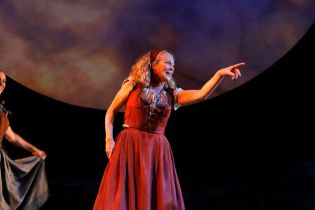When you sit down to watch Rona Munro‘s The Last Witch, you may already have an inkling that the play does not have a happy ending. As suggested by the title, the programme lets us know from the outset that the drama’s action revolves around the last witch burnt at the stake – confirming our sombre suspicions. The Last Witch premiered at the Royal Lyceum Theatre on 23 August 2009 as a commission by the Edinburgh International Festival, in co-production with the Traverse. Opening on the same date in August this year – almost 10 years later – the Pitlochry Ensemble bring a fresh new production to the Highlands.
Many questions are raised as the story begins to unfold. Is Janet Horne really practising witchcraft? Is her daughter Helen touched by the devil? Or are they a product of two women alone coping with grinding poverty and the harsh reality of life in the remote location of highland Dornoch? Living in a society where authority has the power to condemn them without proof, it doesn’t go unnoticed that these conditions still exist around the modern world today.
Played on a stunning set, this production does justice to the story and themes, with faultless performances by a seven-strong cast. Together, they capture the essence of the piece perfectly. Deidre Davis centre-stage as mother Janet Horne brings energy to this incredibly demanding role, in which she is rarely offstage. Her physicality and delivery throughout prove that has a deep understanding of Munro’s text. Fiona Wood complements Davis’s performance with a fine portrayal of the damaged daughter Helen Horne. Sympathy is drawn to her poverty-stricken conditions, with no food or peat for the fire and a mother who looks to the wind and sky to distract from their situation. It was a lovely nuanced performance and very different from her role as Phoebe Throssel in the afternoon show of Quality Street that day.
Switching also from his Quality Street character, Ensign Blades, Qu to playing Captain David Ross, David Rankine delivers a chilling performance filled with such power and presence that he takes control of the stage in the final moments of the play. As for the other cast members, supporting roles are played to perfection and provide understanding of the helplessness of those caught up in the story. Alan Steele brings a quiet black humour to the role of Douglas Begg, the neighbour who unknowingly causes the ensuing persecution. Helen Logan is terrific as his wife Elspeth Begg, grasping Helen as her lost daughter. Her chilling, full-throated wail in the final act stays with you. Graham Mackay-Bruce brings his comedic skills to Niall, the hopeless priest, and Amos Hart is a glowering presence as Nick. Is he really the Devil or just a passing traveller?
Technically, this is a challenging work – the script relies on a public burning at the stake on stage. I waited with bated breath to see how it would be achieved. Fortunately, no actors were harmed, and the special effects prevailed without becoming gruesome. The moon-shaped, raked stage circle and the atmospheric projections enhanced a worthy playing of Rona Munro’s work, offering a satisfying final production from an outstanding season of theatre.
